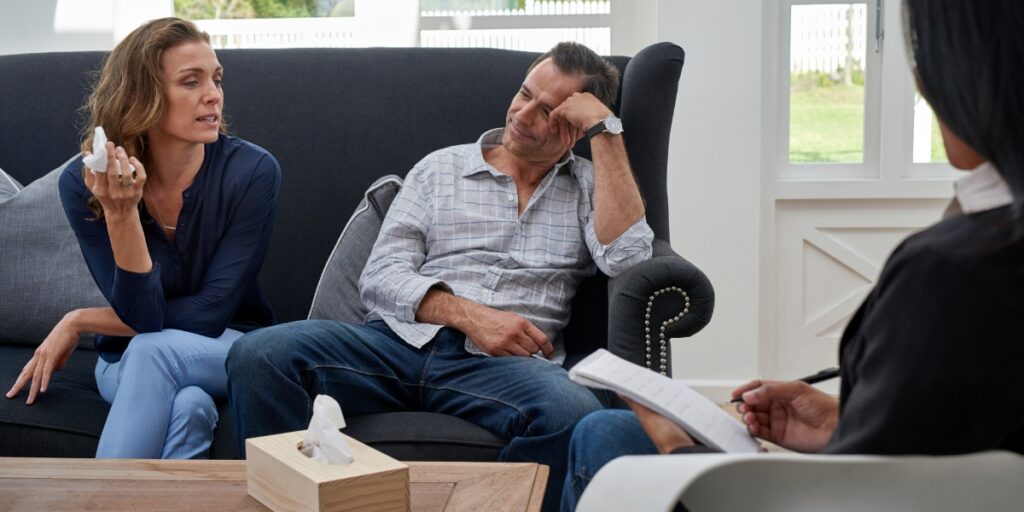Types of Family Therapy

Mental health professionals often call addiction a family disease because it affects family relationships and how family issues contribute to substance abuse in some cases. Marriage and family therapy helps address the effects of addiction, improve communication, and teach skills for improving family dynamics.
Taking an open and active approach to family therapy and relationship counseling allows people room to heal and actively support their loved one’s recovery. Family therapy can be vital in overcoming substance abuse, achieving long-term recovery, and fulfilling relationships.
What Is Family Therapy?
Family therapy is a branch of therapy that examines relationships and interactions between family members and works to improve them through developing healthy communication and problem-solving skills. When it comes to substance abuse, family therapy helps members recognize how it has shaped and harmed their relationships with each other and focuses on repairing and rebuilding them.
A neutral party, like a social worker or licensed family therapist, provides guidance and education to help identify specific problems, dysfunctional habits, and dynamics that contribute to the cycle of addiction. Therapists also work to address the strengths of each family member and build on those to implement clear, direct, and practical changes.
The American Association for Marriage and Family Therapists (AAMFT) establishes and maintains evidence-based guidelines and approaches to family therapy. AAMFT states that marriage and family therapy is:
- Brief
- Solution-focused
- Specific with attainable therapeutic goals
- Designed with an end in mind
Most family counseling is short-term and lasts between 5 to 20 weeks; sometimes, a licensed professional may recommend specialized sessions for longer. People struggling with addiction who participate in family therapy have higher rates of treatment completion, favorable outcomes, and long-term recovery.

Types of Family Therapy
Every family and addiction is unique, and different family therapy techniques are needed to address the impacts of addiction successfully. Marriage and family therapists act as guides and neutral facilitators to help family members discuss and explore their issues in a safe, non-judgmental environment while working on healthy and productive ways to overcome them. As marriage and family therapists get a clear picture of family strengths and weaknesses, they choose which types of therapy will be the most helpful.
Strategic Family Therapy
Strategic family therapy focuses on identifying specific problems in the family unit and working toward improving communication skills, solving problems, setting goals, and outlining straightforward task-oriented ways to achieve those goals. This therapy focuses more on overcoming existing and future issues rather than identifying what caused them.
Structural Family Therapy
Structural family therapy examines and identifies a family unit’s hierarchies and power structures and how they influence and affect communication, interactions, and boundaries. The therapist works with family members to understand how their culture, religion, and other social factors have influenced their relationships and how to recognize and work within those relationships to improve their home environment.
Bowenian Family Therapy
The Bowenian form of therapy works with people who do not want or cannot have their families involved in their recovery. Working under licensed professionals’ guidance, patients define themselves outside of their relationship, or lack thereof, with their families. The other goal of Bowenian therapy is learning how to manage emotions and become less reactive to stressful family interactions that can be triggering.
Systemic Therapy
Systemic therapy looks at a broader context and belief systems influenced by culture, economic class, religion, and communities. Families often feel pressure to present a united, problem-free impression to the outside world, leading to resentment, arguments, and dysfunction behind closed doors. Therapists work with the family unit to identify and examine how they’ve adapted to those influences, break down the problems caused, and set realistic expectations and attitudes for the whole family.
Transgenerational Therapy
Transgenerational therapy examines family interactions and dynamics throughout more than two generations. This type of therapy is significant in multi-generational households or families with more than one relative struggling with addiction. Family members work to recognize communication and behavior patterns and how to break the cycles that have contributed to dysfunction.
Marriage and Relationship Therapy
Couples therapy is the most common term for this type of therapy that examines how addiction has affected the relationship between partners and the specific problems they face. With the guidance of a therapist, couples work on improving communication skills, setting healthy boundaries, and developing substance abuse-specific coping skills like how to prevent or deal with relapse. It is typical for each partner also to attend individual therapy.
Communication Therapy
Communication therapy is integral to all types of therapy and treatments. People have different communication styles, leading to conflicts, misunderstandings, and resentments when they don’t match up. Therapists can help participants identify their ways of expressing themselves and how to make that relatable to people who communicate differently. Communication therapy teaches participants to listen actively, consider each others’ feelings, and express themselves calmly and constructively.
Narrative Therapy
Narrative therapy acknowledges that everyone experiences things differently and how that shapes their perspective and coping skills. For example, a father who gets drunk at family functions might think he is the life of the party. However, his kids might be embarrassed and associate special occasions with anxiety and damage control. Narrative therapy offers a chance to explore and understand the different experiences and reactions and how to be aware of those in the future.
Psychoeducation
Psychoeducation provides knowledge and perspective to understand mental health conditions better and remove stigmas around them. Learning about mental illness and how it affects daily life opens communication, builds understanding, and teaches medication and treatment compliance support techniques. Education and awareness help improve relationships and set up a framework for a supportive and safe environment to discuss the realities and difficulties of living with mental illness.
Many evidence-based family counseling programs are available, and more are constantly evolving and developing. Licensed marriage and family counselors frequently blend different therapy approaches to make the most progress and achieve the best outcomes.

What Are the Goals of Family Therapy?
The ultimate goal of family therapy is healing and developing a healthy and supportive environment and future for the entire family unit. Family counseling provides a neutral, mediated way to explore, reframe, and strengthen relationships while learning healthy problem-solving and communication skills.
The benefits and goals of family therapy include:
- Education about substance abuse and mental health conditions
- Improved and practical communication skills
- Encouraging behavioral changes
- Establishing clear boundaries and expectations
- Strengthing support and problem-solving skills
Treatment plans that involve family therapy have proven studies to help reduce the chances of relapse and make it easier to maintain recovery and a sense of belonging.
Many proven studies demonstrate that substance abuse treatment plans involving family therapy have helped reduce the chances of relapse and make it easier to maintain recovery and a sense of belonging.
Family Therapy at Northridge Addiction Treatment Center
At Northridge Addiction Treatment Center, we understand that family dynamics can be complicated. We strive to improve those relationships and foster a healthy support system for you to return to or build after treatment.
Our personalized treatment plans are evidence-based and designed to address your unique needs. Our licensed marriage and family therapist provides compassionate, judgment-free, guided family therapy sessions to help heal old wounds and increase understanding and support for the future.
Allow us to help you take your first steps on the path to recovery. Reach out to us today.
Find Meaningful Recovery
Our caring and compassionate specialists are eager to help you comfortably navigate this journey to recovery. Our individualized treatment plan, programs, and therapies may be a perfect match for you or your loved one. Let us assist you in living the happy life you deserve. It starts with a phone call.




